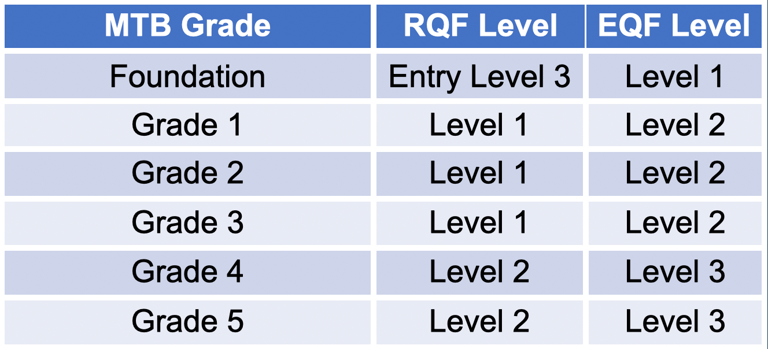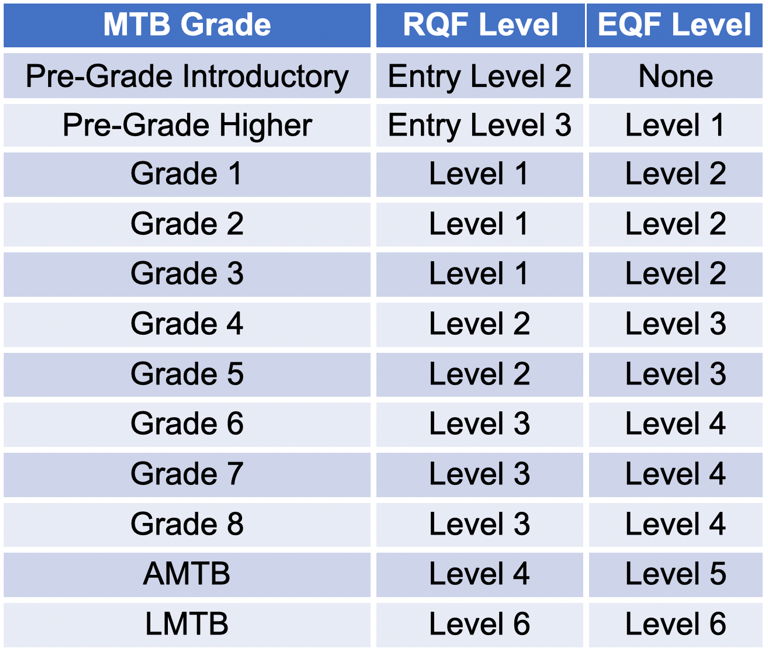Navigating MTB Exams - A Guide for Students & Parents
MTB's accreditation & international value
At Aum Piano Studio, students gain more than musical mastery - they earn qualifications with real academic and global value. Through our partnership with the Music Teachers’ Board (MTB), learners receive certifications aligned with three key education frameworks: UCAS (Universities and Colleges Admissions Service) and the RQF (Regulated Qualifications Framework) used in the UK, and the EQF (European Qualifications Framework) used across Europe. This alignment allows us to offer more than music education - we support academic growth, strengthen university applications, and open doors to international opportunities.
What are UCAS, RQF and EQF?
UCAS Tariff Points:
UCAS Tariff points convert qualifications and results into numerical values that UK universities use to assess applicants. The points depend on the qualification level and the result achieved, helping universities determine whether entry requirements for courses are met.




RQF – Regulated Qualifications Framework (UK):
The RQF is the national framework for regulated qualifications in England, Wales, and Northern Ireland. It organises qualifications by levels of difficulty, from Entry Level to Level 8:
Entry Levels: For beginners (e.g., Pre-Grade and Foundation)
Levels 1–3: School-level qualifications (GCSE to A-Level)
Levels 4–6: Equivalent to higher education or professional diplomas
MTB music grades from Grade 1 to Diplomas (AMTB and LMTB) are assigned RQF levels, making them recognised parts of the UK’s official education system.
EQF – European Qualifications Framework:
The EQF is an 8-level system used across Europe to standardise qualifications and make learning achievements comparable across countries, including EU member states, Norway, Switzerland, and Turkey.
Instrumental Grades
Music Theory Grades




Recognition Beyond Europe
Many non-European countries reference or align their qualification systems with the EQF to evaluate international credentials for education and migration:
US & Canada: Use EQF as a benchmark to assess and credit foreign qualifications.
Australia & New Zealand: Have their own frameworks but often map them to the EQF for student exchanges and visas.
Middle Eastern Countries, China, Malaysia & Singapore: Increasingly recognise EQF-aligned qualifications for schools, conservatories, and migration - Singapore widely accepts UK qualifications linked to the EQF.
Understanding MTB Examinations
Instrumental Exams
MTB Exams offer two distinct pathways for instrumental music assessment: Practical Grades and Performance Grades.
MTB Practical Grades offer a comprehensive assessment of a musician’s skills, covering performance, technique, and musicianship. Candidates perform three pieces, demonstrate technical skills via scales, arpeggios and exercises, and complete musicianship tests like sight-reading, duet and aural assessments. This well-rounded approach helps students develop strong technical proficiency alongside performance skills, ensuring a solid foundation in all aspects of musical growth.
MTB Performance Grades focus solely on recital-style assessments, where candidates perform 4-5 pieces within a specific duration. With no technical or musicianship tests, students can fully concentrate on their expressive and interpretative abilities. This format emphasises stagecraft, musical communication, and overall presentation, making it ideal for those who prefer a performance-centred evaluation.
MTB Interactive Theory Exams offer a fully digital and engaging approach to music theory assessment. The interactive questions go beyond multiple-choice formats, including tasks like dragging notes onto a staff, identifying rhythms from audio clips, matching symbols, and constructing scales and chords. This hands-on format makes learning more practical and immersive. To support preparation, MTB provides structured theory courses and practice materials, which can be purchased via their website, helping students build a strong foundation and gain confidence before the exam.


Music Theory Exams

Pre-Grades = Rs. 3,740/-
Grade 1 = Rs. 4,290/-
Grade 2 = Rs. 4,890/-
Grade 3 = Rs. 5,690/-
Grade 4 = Rs. 6,240/-
Grade 5 = Rs. 6,840/-
Grade 6 = Rs. 7,990/-
Grade 7 = Rs. 8,690/-
Grade 8 = Rs. 9,590/-
AMTB = Rs. 14, 290/-
LMTB = Rs. 22, 990/-
Foundation = Rs. 3,690/-
Grade 1 = Rs. 4,090/-
Grade 2 = Rs. 4,390/-
Grade 3 = Rs. 4,790/-
Grade 4 = Rs. 5,290/-
Grade 5 = Rs. 5,590/-
Grade 6 = Rs. 6,290/-
Grade 7 = Rs. 6,790/-
Grade 8 = Rs. 7,390/-
*All fees include 18% GST and are valid until March 31, 2026.
*These fees are set by the MTB board, not Aum Piano Studio, and cannot be considered part of lesson fees. They must be paid directly to the MTB board.
Exam Registrations & Submissions
MTB Grades provide flexible, on-demand exams with no fixed registration periods or scheduled exam sessions. Students can register and pay at any time of the year, then submit their instrumental exam video or take their theory exam whenever they’re ready - within one year of registering. This flexibility allows candidates to prepare at their own pace, choose the best time to take their exam, and avoid conflicts with school exams, holidays, or other commitments.
Instrumental Exam Fees
Music Theory Exam Fees
Recording and Submission Guidance For MTB Instrumental Exams
The exam video may be recorded in either portrait or landscape mode, but it must clearly capture the candidate’s face, hands, and the full instrument at all times. The recording should be a single, continuous take, with all components performed in sequence, without any edits.
At the start of the video, the candidate must introduce their full name, exam type (Practical or Performance), instrument, and grade.
For Practical Grades, candidates should introduce each piece and each component of technical work and musicianship before performing. In the 'Scales & Arpeggios from Memory' section, all notation sheets must be kept aside, the prompt sheet must be held close to the camera for 10 seconds before playing, and candidates must perform from memory using only the prompt sheet as a reference.
For Performance Grades, candidates must introduce each piece before playing. After introducing a piece, they must speak a few sentences about it to demonstrate their musical knowledge and understanding. Alternatively, they may submit a written programme alongside the exam video.
The video must be in MP4 or MOV format and should not exceed 3GB in file size.
For Grade 6, 7, and 8 submissions, candidates must upload a valid photo ID (Aadhar card, passport, or valid school/college ID).
Dear Students & Parents, for enquiries and support regarding registering & submitting for MTB Exams, please contact:
Padmavathy Divakaran
Director - Aum Piano Studio
WhatsApp: (+91) 8754535730
Email: support@aumpianostudio.com